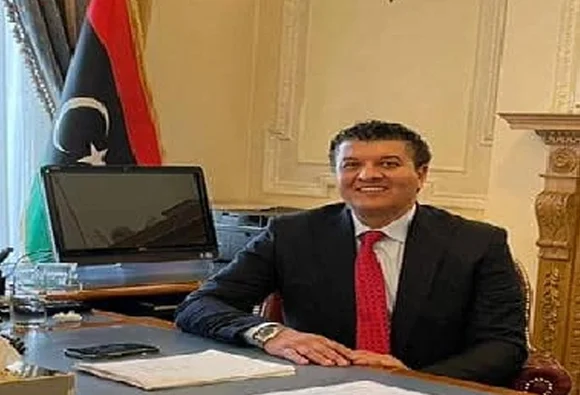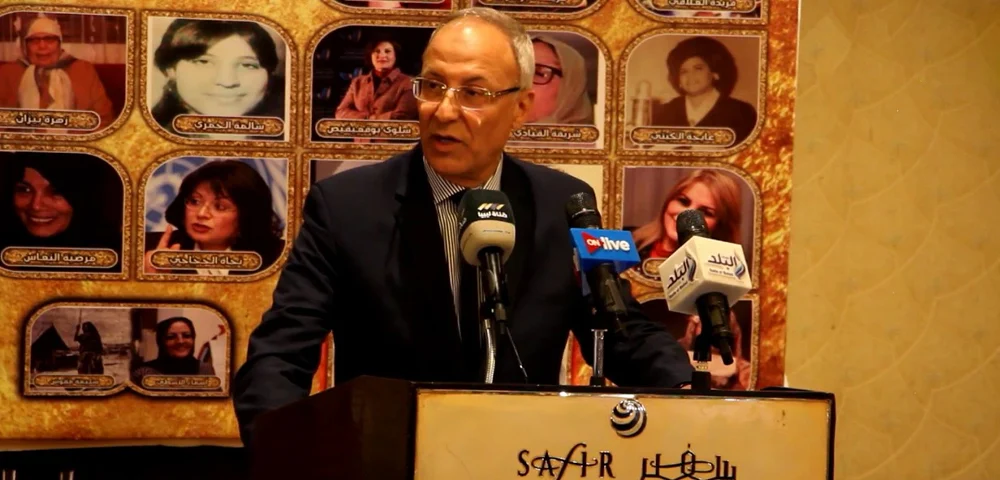A new sex scandal has surfaced involving the Libyan diplomatic community, which, as soon as it overcomes one moral crisis, stumbles upon another.
The leading protagonist of the latest story is the Libyan ambassador to London, Salah Mehril, who was recently expelled from the country by the British authorities after being implicated in a sex scandal, adding the latest installment in the series of scandals that senior officials, diplomats and ambassadors of the Libyan government have been exposed to abroad.
Mehril, who served as an external security officer during the Gaddafi era, took up his post only a year ago as a non-resident ambassador to Libya, based on a personal recommendation from Abdul Hamid Dbeibeh, the head of the unity government, and with the support of Mohamed al-Menfi, head of the Presidential Council, who is responsible for appointing right-wing ambassadors abroad.

The story began with Mehril's harassment of a Libyan citizen who came to the embassy and met him in his office to request a service.
The female citizen played it safe, and kept silent before leaving the embassy, but due to requirements needed for her official papers, she was forced to go back once again to the embassy, and here – according to her account – Ambassador Salah Mehril tried to sexually assault her after closing the door of his office and locking it with her inside. But she managed to escape, and filed an official complaint with the authorities, which investigated the incident and ended up with the decision to expel him and his family from British soil.
The news quickly spread from the official records to social media pages, where twitter users expressed their distress at the repeated immoral practices that Libyan foreign officials and diplomats abroad are involved in, calling for a reassessment of the criteria for selecting the country's representatives abroad, so as not to turn into the "world's laughing stock", as one of them put it.
Official silence
Raseef22 tried to contact Najwa Wheba, spokesperson for the Libyan Presidential Council, and Mohamed Hammouda, spokesman for the Dabaiba government, to comment on this story, but they declined to comment.
But an official source in the Libyan Foreign Ministry (who asked not to be named) told Raseef22 that both al-Menfi and Dbeibeh sought an official clarification from the British government about the reasons for what happened, noting that the British response was brief, where they just said that the Libyan ambassador in London was no longer welcome.
On April 5, 2022, Mehril, a member of the Libyan External Security Organization – ESO (Libyan intelligence), during the era of the late Libyan Colonel Muammar Gaddafi, officially presented his credentials as Extraordinary and Plenipotentiary Ambassador of the State of Libya to the United Kingdom and Northern Ireland, to the late Queen Elizabeth II before her death, in an official ceremony that took place at Buckingham Palace in the British capital, London.
Ambassador Salah Mehril's sex scandal was not the first of its kind in the Libyan diplomacy scene, as this has happened a few times before with other Libyan ambassadors in different capitals.
A history of scandals
Ambassador Salah Mehril's sex scandal was not the first of its kind in the Libyan diplomacy scene, as this has happened a few times before with other Libyan ambassadors in different capitals.
In 2019, Ambassador Saleh al-Shamakhi lost his position as Libya's permanent representative to the Arab League in Cairo, following his involvement in a sexual blackmail scandal in Cairo.
After an "audio recording" of Saleh al-Shamakhi sexually blackmailing an Egyptian woman working in one of his offices, went viral, the House Foreign Affairs Committee denounced the incident, describing it as "immoral behavior".
The irony is that, despite this scandal, which was officially condemned by the House of Representatives, al-Shamakhi continued his work as ambassador, and went on to demand the position of the country's delegate in the Arab League in Spain, and when the Libyan Foreign Ministry rejected his request, he sent a letter to the president and deputies of the Presidential Council asking them to intervene to resolve his crisis with the Libyan Foreign Ministry, as he put it.
On the other side of the world, specifically in the Russian capital, Moscow, the Libyan ambassador Mustafa Bousaida, head of the Libyan diplomatic mission in Russia, was fired in 2018, after a female Russian employee accused him of harassing her and attempting to rape her in his office. The incident was confirmed by his private driver and an employee in the building, and resulted in the Russian government's decision to expel him, after several Russian female employees of the Libyan embassy filed collective complaints against him, accusing him of constantly harassing them in his office at the embassy.

Imprisoning ambassadors en masse
Sexual scandals were not the only accusation that some members of the Libyan diplomatic community have faced, as the list of scandals include financial cases that sometimes resulted in the imprisonment of some ambassadors. The Audit Bureau recently revealed in its annual report what it described as rampant corruption in some Libyan embassies abroad, against the background of a huge amount of financial violations and irregularities that have been detected.
Recently, a campaign by Libyan Attorney General Siddiq al-Sour has led to the arrest of some former ambassadors and diplomatic staff on charges of financial and administrative corruption within Libyan diplomatic missions abroad.
Among those arrested was Libya's ambassador to Italy, Omar al-Tarhouni, who is accused of involvement in improper financial gain, specifically regarding medical supplies allocated for the treatment of Libyans in the country.
Three former Libyan ambassadors to Ukraine are also currently in prison on charges of financial corruption, embezzlement of study allowances, and illegally obtaining hundreds of thousands of foreign currency for themselves and others.
Another decision was issued to imprison Libya's former and current ambassadors to South Africa, the financial controller of the embassy there, as well as the financial controller of the Libyan embassy in the Qatari capital, Doha, following their involvement in financial corruption cases.
Can Libya's attorney general rein in rampant corruption in the diplomatic field, or has the breach widened too much on the ground?
For her part, Libyan Foreign Minister Najla Mangoush recently responded to the remarks of Khaled Shakshak, the head of the Audit Bureau, and decided to temporarily suspend the expansion of issuing diplomatic assignments, until all previous decisions are verified for compliance with the law.
The financial accusations and ethical issues that pop up on the surface from time to time in Libyan diplomacy, and which have recently become widespread, have led many to ask: Can the attorney general rein in corruption in this vital sector, or has the breach widened too much on the ground?
Raseef22 is a not for profit entity. Our focus is on quality journalism. Every contribution to the NasRaseef membership goes directly towards journalism production. We stand independent, not accepting corporate sponsorships, sponsored content or political funding.
Support our mission to keep Raseef22 available to all readers by clicking here!
Interested in writing with us? Check our pitch process here!





